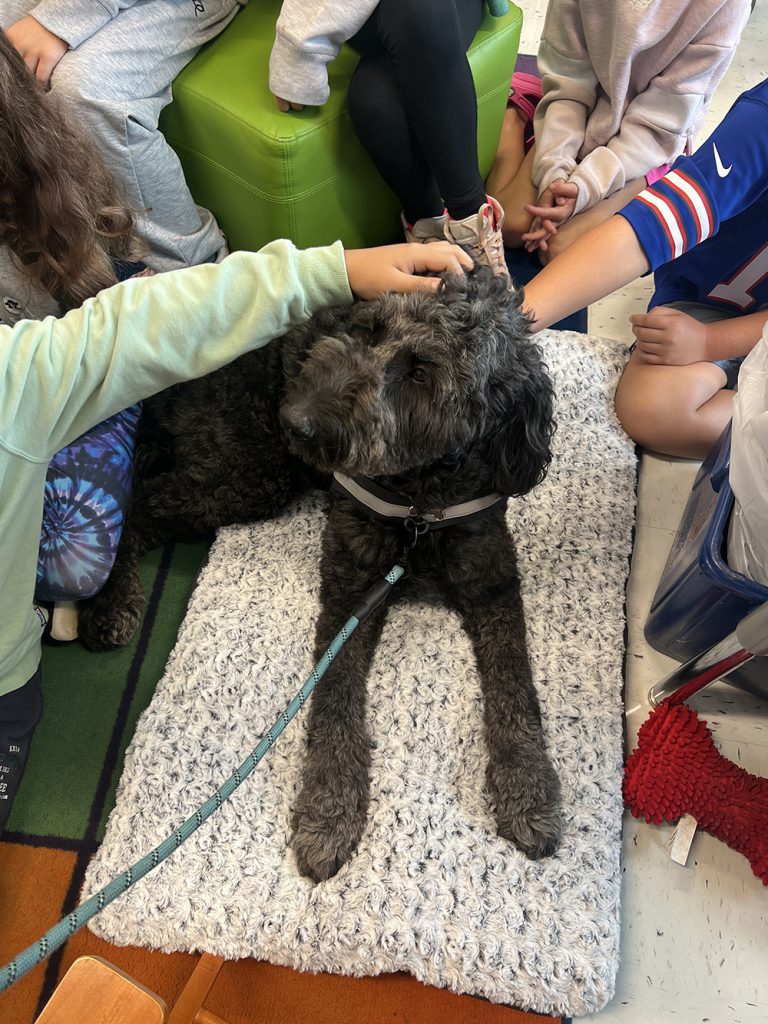Table of Contents



Welcome
Supporting students’ mental health is what our counseling staff members do all day, every day. Regardless of the issue a student is dealing with, emotion is involved. Whether a kindergartener is arriving at school for the first time or a high school student is trying to figure out what life looks like after graduation, each experience carries a variety of emotions. Helping students recognize their feelings and learn how to manage them is the foundation of our counseling team’s work.
School Counseling Department pages
Supporting Students’ Mental Health and Emotional Needs
Sometimes students are struggling; growing up has its challenges. They may be having difficulty with friendships or other relationships, experiencing frustration with their academics, coping with stress, and anxiety, dealing with a loss and/or generally struggling to manage their emotions.
Our student support team is eager to help.
View our Supporting Students Mental Health page to learn how the district supports the social-emotional learning and development of all students through education, activities, and training for students, parents, and staff.
View our Mental Health Resources page to learn how we partner with local agencies to provide access to mental health and how to access additional helpful mental health resources.
Comprehensive School Counseling Plan
The Fayetteville-Manlius School District Comprehensive School Counseling Plan has been designed to meet the academic, career/college and social/emotional demands of all students in order to better serve the Fayetteville-Manlius school community.
View the Comprehensive School Counseling Plan.
Our Counseling Staff
Fayetteville-Manlius school counselors work together with students and parents to promote personal success by enhancing the development of academic skill, interpersonal skills, and self-understanding.
In order for students to learn effectively, they must feel comfortable and safe in their school environment. To help accomplish this goal, school counselors provide individual and group counseling programs.
Parents are encouraged to contact a member of the counseling department if they have concerns about their children’s progress or well-being. By working closely together, parents, counselors and teachers can help each student reach their highest possible level of accomplishment.
Counseling Staff Roles
Each elementary school has a school counselor, school psychologist and student engagement specialist. Each middle school has two school counselors and a school psychologist. F-M High School has six school counselors and a school psychologist. The district psychologist also resides at the high school. There are two student assistance counselors; one who serves both middle schools and one who serves the high school. Additionally, there are six family-school liaisons (FSL) that support all of the buildings; one in each building.
Each role has an important impact on the emotional health and well-being of students. There are some areas in which services overlap, and there are some distinctions between each role as well. Regardless of titles, counseling staff members seamlessly work together as a team, both within the schools and districtwide, regularly consulting with one another to support students and families.
School Counselors
Serving the entire student population through schoolwide programming and initiatives
School counselors provide a broad range of services in the areas of academic support, career development, and social/emotional learning. They connect and communicate with those in the student’s circle including teachers, parents, administrators and, at times, outside support services.
A student may see a school counselor about:
- Academic Success and Support: Classroom related challenges, academic placement, time management/organization, achievement and scheduling.
- Personal and Social Development: Peer relationships, self-confidence, stress management, loss and separation, self-awareness, and adapting to transitions.
- Future planning: Exploring interests and strengths to begin identifying potential career paths and plan for life beyond F-M.
School Psychologists
School psychologists serve students who have specific social-emotional and/or behavioral needs that hold them back from learning. The psychologists administer psychological testing, participate in developing individualized education plans (IEPs), help students with learning strategies and consult and collaborate with parents and school staff.
When appropriate, school psychologists set goals and provide individual or group counseling as prescribed on a student’s IEP/504 Plan or under the Educationally Related Support Services (ERSS) model.
Family-School Liaisons
Family-School Liaisons (FSL) provide intensive support to students most in need. They can work directly with the whole family system, creating a positive, supportive relationship between home and school.
At the elementary and middle schools, FSLs often meet with small groups of students during lunch to develop skills. At the high school, the FSL mostly works with students individually. They work closely with the school counselors, school information resource officers and special patrol officers, and frequently connect families to outside support agencies and organizations as needed.
Student Engagement Specialists
Student engagement specialists identify and provide support to students with emotional or behavioral challenges.
Each of the district’s three elementary schools has one student engagement specialist who works with the school’s student support team to supplement existing mental health services. The specialists also assist with implementing targeted interventions and focus on collaborative problem solving, in-class support, and de-escalation.
Student Assistance Program Counselors
Student Assistance Program Counselors (SAPs) are licensed social workers who provide drop-in, confidential mental health support for students during the school day.
They offer students prevention education and support around healthy coping, decision-making, and overall well-being; short-term, confidential counseling to help students manage stress, emotions and life challenges; and referrals to additional community support, including mental health and substance abuse treatment providers.
Therapy Dog Program

To help support students and staff who may be dealing with increased stress or anxiety levels, there are 20 therapy dogs (at least one at each school building) working to greet students in the morning, visit classrooms and spend time with students and/or staff. They are trained to provide support in a community setting.
All of F-M’s therapy dogs have completed training and earned their American Kennel Club (AKC) Canine Good Citizen (CGC) certification. The AKC CGC program is a 10-skill obedience training program.
While on school grounds, therapy dogs are always on a leash and accompanied by an adult. To maintain the safety and comfort of everyone in the building, all interactions with the therapy dogs are voluntary.
Parent Conferences
Administrators, counselors, and teachers welcome the opportunity to confer with parents.
Conferences may be initiated by parents at any time they have a concern at any level. This is done by contacting the child’s teacher, counselor, or principal. Requests for meetings should be made at least a few days in advance.
Departments & Services Links
When Questions Arise
Often parents are uncertain about whom to contact in order to answer a question or pursue a concern. The following guidelines are designed to provide clarification:
a child’s personal adjustment, future plans, schedule, etc.
The school counselor is the key communication link between the home and the school.
a child’s classroom progress
Contact the teacher for a question regarding a child’s classroom progress.

Mental Health Referral
The Fayetteville-Manlius School District encourages our community to report or self-report any student, faculty, or staff who may be experiencing a personal challenge so that we can provide support to that person. Please note that any referral made via this form will result in outreach by school staff.